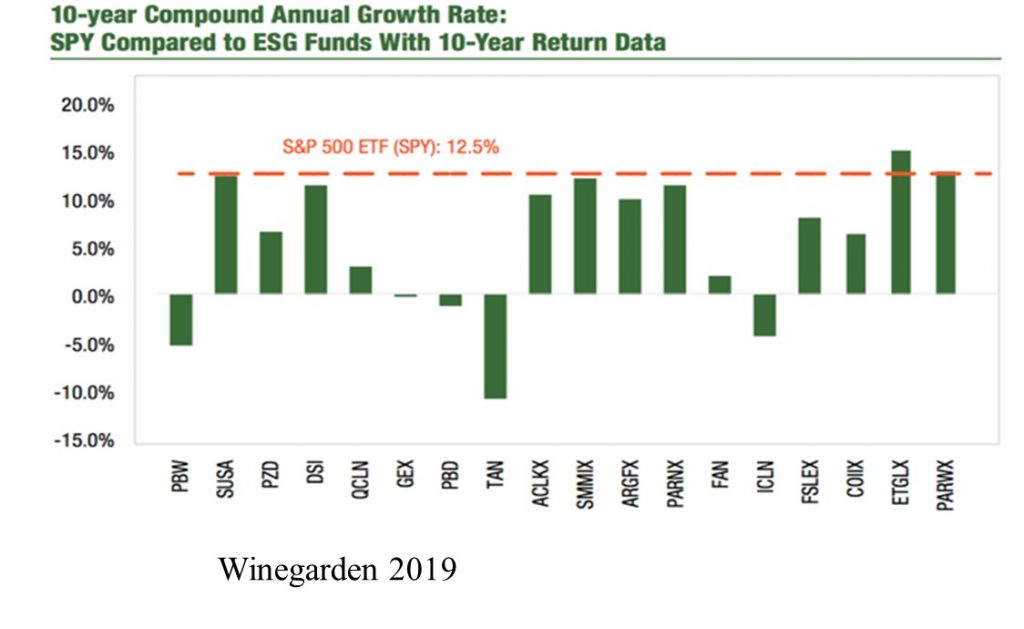By Evan Kravetz | Entoro Capital
From The Archive with an Update:
I’ve seen quite a few pieces on ESG investing recently. In 2019, I wrote an article detailing some of its shortfalls. As of November 2020, many of these shortfalls have been addressed which has prompted me to include the addition below.
Let’s Get to Know ESG Before We Jump In:
The interest and application of socially responsible investing continue to increase, rising to new levels in 2018-2019. A product of that growth – ESG investing – has transformed from a niche strategy among smaller investors to a potentially key component of institutional portfolios. What is ESG you may ask? ESG represents a three-pronged approach used to determine the merits of potential portfolio companies. Portfolio managers and investors examine the Environmental (E), Social (S), and Governance (G) policies and outputs of each company under consideration. They then select targets using a combination of traditional fundamental and technical stock analyses with weighted ESG metrics.
As one would in any prudent investment, it’s crucial to back up and see the full picture rather than rush in uninformed. Despite good intentions, early returns show ESG has glaring holes that need to be examined before dollars go out the door.
Here are a few to note:
- Much of the information used to score a company’s ESG metrics comes self-reported. Naturally, this may cause misleading or greenwashed data.
- Reporting ESG metrics, whether strong or not, actually facilitates higher scores on ESG management ability. Transparency is no longer a positive when it may be warped for benefit. Citigroup analyst Christopher Chapman writes “Companies facing more acute ethical or sustainability issues tend to be better versed in disclosing against them, which further distorts the relationship between what might be considered actual ESG performance and ESG rating.”
- ESG Funds often aren’t as “green” as investors are led to believe. In 2019, Forbes reported a large fund meant to exclude fossil fuels and other “vice” industries had $7.5 MM invested into oilfield and fossil fuel companies. The Wall Street Journal has found that some of the largest ESG funds have a comparable proportion of investment towards fossil fuel industries as the S&P 500’s total holdings. In some cases, ESG funds may as well be a common S&P Index fund.
Understood by institutions, portfolio managers, and investors, performance is king. Quite often, companies prejudiced by ESG metrics deliver consistently superior returns than their counterparts with higher ESG scores. Last year, The Pacific Research Institute studied this notion, concluding “…over the long-term, it is difficult for ESG funds to outperform the broader market indices.”

Sustainability, fair governance, and moral social practices aren’t problematic things to strive for. However, it is abundantly clear the ESG strategy needs some fine-tuning. This is especially the case in the energy investment arena, where ESG metrics should weight efforts to produce clean energy with the demand for crude energy. The Sustainable Accounting and Standards Board (SASB) for one should be applauded for its creativity in grading ESG in the crude energy space.
Like any investment trend, ESG should be further analyzed before family offices and portfolio managers jump in.
Update: November 2020
The turbulent year of 2020 has no doubt thrown capital markets in an array. As volatility plagued institutions and advisors alike, the demand for transparent, consistent, and efficient ESG scoring has risen. Portfolio management titan BlackRock has led some of the charges, calling for a globally recognized framework to mitigate the risks of greenwashed and opaque data.
Answering the call, The Big Four firms have spearheaded efforts to create a scalable structure for ESG investors, hoping to empower companies and investors alike with a new streamlined and efficient framework. In a piece published as a part of The Sustainable Development Impact Summit, Robert Mortiz, global chairman of PwC stated “Stakeholders — including investors, but also policymakers consumers and employees — need more rounded, comparable and robust information to make decisions. Get that information flowing, align market incentives against performance on these metrics, and a better tomorrow becomes possible.”
As the push for standardization continues, consumer-friendly tools to analyze ESG metrics within portfolios are becoming more common. YvesBlue is a system that allows consumers to upload their portfolio and receive an in-depth analysis of its environmental and social impact. Important to note, the system also allows its members to see how their portfolio stacks up to standard indexes.
YourStake is an online platform that takes it one step further. The platform provides ESG analysis and serves as an online petition platform for shareowners. Thus, the system allows shareholders to evaluate portfolios while simultaneously participating in movements to steer companies closer to public interests and ESG values.
Assuming a successful vaccine and COVID free world at some point in 2021, expect to see major movement in ESG investing strategies as new and improved systems come to market.
Evan Kravetz serves as a Director of Investment Banking & Athlete Impact Investment at Entoro Capital. A 5th round selection of the 2019 MLB Draft by the Cincinnati Reds, Evan holds Series 7 and 63 licenses and leads Entoro’s efforts to source impact opportunities for current and former athletes.
Sources:
- https://www.forbes.com/sites/daviddawkins/2019/07/19/why-oil-and-gas-stocks-keep-leaking-into-green-investments/#183a613a1034
- https://www.wsj.com/articles/top-esg-funds-are-all-still-invested-in-oil-and-gas-companies-11573468200?mod=hp_lead_pos2
- www.advisorperspectives.com/articles/2019/06/24/the-disappointing-reality-about-esg-fund-performance
- https://www.sasb.org/wp-content/uploads/2018/11/Oil_Gas_Exploration_Production_Standard_2018.pdf
- https://www.pacificresearch.org/new-study-finds-esg-funds-underperform-broader-investment-funds-over-long-term/
- https://www.yourstake.org/learn/
- https://www.ft.com/content/2a8d7fac-5ab6-43e5-9e04-8e9b3adfd195#comments-anchor
- https://www.accountingtoday.com/news/big-four-firms-release-esg-reporting-metrics-with-world-economic-forum
- https://www.yourstake.org/learn/
- https://www.businesswire.com/news/home/20191217005157/en/Flat-World-Partners-Expands-into-Hedge-Fund-Market-Through-Partnership-with-Titan-Advisors
- https://www.barrons.com/articles/those-socially-responsible-esg-ratings-dont-mean-as-much-as-you-might-think-51556884801








